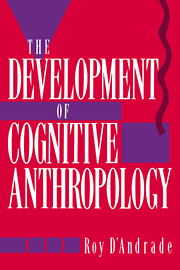Book contents
- Frontmatter
- Contents
- List of figures
- List of tables
- Preface
- 1 Background
- 2 Towards an analysis of meaning
- 3 The classic feature model
- 4 Extension of the feature model
- 5 Folk taxonomies
- 6 The growth of schema theory
- 7 Models and theories
- 8 Cultural representations and psychological processes
- 9 Cognitive processes and personality
- 10 Summing up
- References
- Name index
- General index
- Frontmatter
- Contents
- List of figures
- List of tables
- Preface
- 1 Background
- 2 Towards an analysis of meaning
- 3 The classic feature model
- 4 Extension of the feature model
- 5 Folk taxonomies
- 6 The growth of schema theory
- 7 Models and theories
- 8 Cultural representations and psychological processes
- 9 Cognitive processes and personality
- 10 Summing up
- References
- Name index
- General index
Summary
Cognitive anthropology is the study of the relation between human society and human thought. The cognitive anthropologist studies how people in social groups conceive of and think about the objects and events which make up their world – including everything from physical objects like wild plants to abstract events like social justice. Such a project is closely linked to psychology because the study of how particular social groups categorize and reason inevitably leads to questions about the basic nature of such cognitive processes.
Early history
The story of cognitive anthropology begins in the late 1950s. To make comprehensible what was happening at this time requires understanding certain aspects of the history of anthropology. Anthropology started as a professional field of study in the late nineteenth century. The original charter of anthropology was to fill in a missing piece of human history – or, more accurately, human “prehistory,” the period of time before written history and the rise of the classic civilizations. Part of the motivation for this agenda was western society's discovery of the native peoples of the Americas, the Pacific, and the far Orient. European savants speculated with great interest and imagination about where these people might have come from and what their history might have been. Obtaining facts to resolve these questions rapidly grew into a recognized field of scholarly endeavor in the late nineteenth century.
- Type
- Chapter
- Information
- The Development of Cognitive Anthropology , pp. 1 - 15Publisher: Cambridge University PressPrint publication year: 1995



